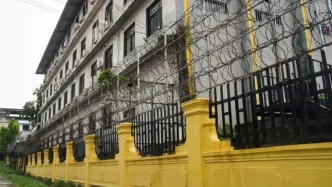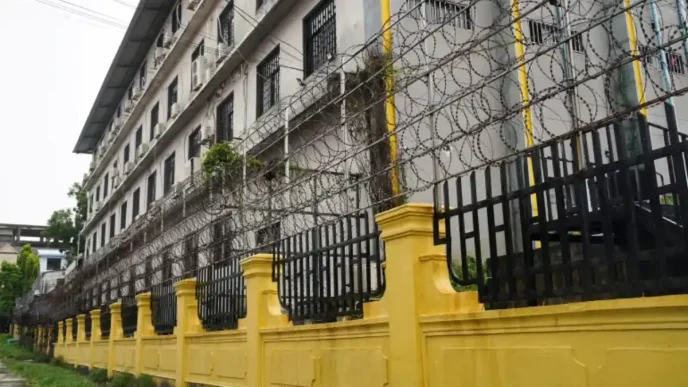In a significant escalation of anti-corruption efforts, the Malaysian Anti-Corruption Commission (MACC) has launched an investigation into four former senior officers linked to ex-Prime Minister Datuk Seri Ismail Sabri Yaakob. The probe, which also involves summoning eight individuals for questioning, centres on allegations of corruption and potential violations of anti-money laundering laws. MACC Chief Commissioner Tan Sri Azam Baki confirmed that the investigation is underway, with witness statements to be recorded as early as this week, raising questions about the legacy of Ismail Sabri’s administration, which ended in November 2022.
The unfolding case has gripped Malaysia’s political landscape, spotlighting the country’s ongoing battle against graft at the highest levels of government. While no direct accusations have been levelled against Ismail Sabri himself, the detention of his former aides and the scope of the investigation signal a broader push for accountability under current leadership. With documents under review and legal frameworks beyond the MACC Act 2009 in play, the probe could have far-reaching implications for Malaysia’s political elite.
Detentions and Witness Summons Mark Investigation’s Intensity
On 21 February, MACC detained four individuals connected to Ismail Sabri at the Putrajaya Court under a remand order issued by Magistrate Irza Zulaikha Rohanuddin. According to sources within the agency, three of the suspects were held for five days, while the fourth was remanded for three days before being released on 25 February. The identities of the detained individuals have not been officially disclosed, nor have specific details of the allegations against them been made public.
Adding to the investigation’s momentum, Tan Sri Azam Baki announced that eight witnesses would be called in for questioning over the coming weeks. “We will summon eight witnesses this week and also next week,” he told reporters, as reported by Bernama on 28 February 2025. While the MACC chief did not elaborate on the roles of these individuals, their involvement suggests the probe is casting a wide net to uncover potential irregularities during Ismail Sabri’s tenure.
The investigation is not limited to corruption charges under the Malaysian Anti-Corruption Commission Act 2009. Azam confirmed that the Anti-Money Laundering Division is actively examining seized documents, with the case also falling under the Anti-Money Laundering, Anti-Terrorism Financing and Proceeds of Unlawful Activities Act 2001. This dual legal framework underscores the complexity of the allegations, which may extend beyond traditional graft to include financial misconduct or illicit transactions.
A Legacy Under Scrutiny
Ismail Sabri Yaakob, who served as Malaysia’s Prime Minister from August 2021 to November 2022, led the country through a tumultuous period marked by the aftermath of the COVID-19 pandemic and political instability following the 1MDB scandal that had already tarnished the nation’s reputation. His administration faced criticism for economic challenges and governance issues, though he was not directly implicated in major corruption scandals during his tenure. The current MACC investigation, focusing on his senior officers, raises speculative questions about whether systemic issues persisted under his leadership—though no evidence has yet emerged to confirm such claims.
Malaysia’s history of high-profile corruption cases, most notably the 1MDB financial scandal involving former Prime Minister Najib Razak, has made anti-graft measures a central pillar of public discourse. Najib, convicted in 2020 on charges related to the misappropriation of billions of ringgit, remains a symbol of the entrenched challenges facing Malaysia’s political system. Against this backdrop, the MACC’s latest probe into Ismail Sabri’s associates could either reinforce public cynicism or signal a renewed commitment to rooting out corruption, depending on the outcomes.
If the investigation uncovers substantiated evidence of wrongdoing, it may impact public trust in Malaysia’s political institutions further. However, without confirmed findings, such outcomes remain speculative. Analysts note that the MACC’s actions reflect a broader trend under Prime Minister Anwar Ibrahim’s administration, which has prioritised anti-corruption reforms since taking office in late 2022. Whether this probe will lead to systemic change or be perceived as politically motivated remains an open question, one that requires careful monitoring as the case develops.
Legal and Political Implications
The invocation of the Anti-Money Laundering, Anti-Terrorism Financing and Proceeds of Unlawful Activities Act 2001 in this investigation points to the possibility of financial crimes beyond simple corruption. This law, enacted to combat illicit financial flows, allows authorities to scrutinise transactions and seize assets linked to unlawful activities. The MACC’s focus on seized documents suggests that investigators are piecing together a financial trail, though specifics remain undisclosed at this stage.
Legal experts caution that investigations of this nature must balance transparency with the risk of prejudicing ongoing cases. Under Malaysian law, public statements or media coverage that could influence judicial proceedings may be considered sub judice, potentially complicating the MACC’s efforts to maintain public confidence while adhering to legal norms. The agency’s reticence on the details of the allegations and the identities of those involved may reflect this delicate balance.
Politically, the investigation could have ripple effects across Malaysia’s fragmented political landscape. Ismail Sabri, a member of the United Malays National Organisation (UMNO), was part of a coalition government that faced significant opposition during his tenure. UMNO, historically a dominant force in Malaysian politics, has struggled to regain public trust following the 1MDB fallout. Should the MACC’s probe uncover evidence implicating senior figures tied to Ismail Sabri, it could further weaken the party’s standing, though such outcomes are speculative and unconfirmed at this time.
Conversely, critics of the current administration may view the investigation as a tool to discredit political rivals. Anwar Ibrahim’s government, which includes factions historically opposed to UMNO, has faced accusations of using anti-corruption probes to settle scores. While no evidence supports claims of political motivation in this specific case, the perception of bias could undermine the MACC’s credibility if not handled with transparency and fairness.
Malaysia’s Anti-Corruption Drive in Context
The MACC’s actions come at a time when Malaysia is striving to improve its global standing on governance and transparency. The country has made incremental progress in international corruption indices, such as Transparency International’s Corruption Perceptions Index, but remains below regional peers like Singapore. High-profile investigations like this one are often seen as a litmus test for the government’s commitment to reform, particularly in a nation where public scepticism about elite accountability runs deep.
For ordinary Malaysians, the probe into Ismail Sabri’s former officers may evoke mixed feelings. On one hand, it signals that no one is above scrutiny, a principle vital to democratic governance. On the other, the slow pace of justice in past corruption cases—Najib Razak’s ongoing appeals, for instance—has left many disillusioned about the prospects for meaningful change. If the MACC’s investigation stalls or fails to produce concrete results, it risks reinforcing perceptions of impunity among the political class.
Regionally, Malaysia’s anti-corruption efforts are being watched closely by neighbouring countries grappling with similar challenges. Nations like Indonesia and Thailand, both of which have faced their own high-profile graft scandals, may draw lessons from Malaysia’s approach, particularly in how legal frameworks like anti-money laundering laws are leveraged to combat corruption. For now, the focus remains on whether the MACC can deliver a thorough and impartial investigation without succumbing to political pressures.
Looking Ahead: Accountability or Political Theatre?
As the MACC summons witnesses and reviews documents, the trajectory of this investigation remains uncertain. Will it uncover systemic corruption tied to Ismail Sabri’s administration, or will it fizzle out amid legal and political complexities? At this stage, any conclusions would be premature, and speculation about the guilt or innocence of those involved must be tempered by the lack of publicly available evidence.
What is clear, however, is that the probe represents a critical moment for Malaysia’s anti-corruption agenda. A transparent and evidence-based investigation could bolster public trust in institutions like the MACC, demonstrating that accountability applies even to those once in power. Conversely, any perception of bias or mishandling could deepen public cynicism, further eroding faith in the political system.
For now, Malaysians and international observers alike await further developments. The summoning of witnesses in the coming days may shed light on the scope and direction of the investigation, while the MACC’s handling of seized documents will likely determine whether the case progresses to formal charges. Until then, the legacy of Ismail Sabri’s administration hangs in a delicate balance, shaped by allegations that, if confirmed, could redefine Malaysia’s political narrative—but only if evidence, not speculation, drives the outcome.














